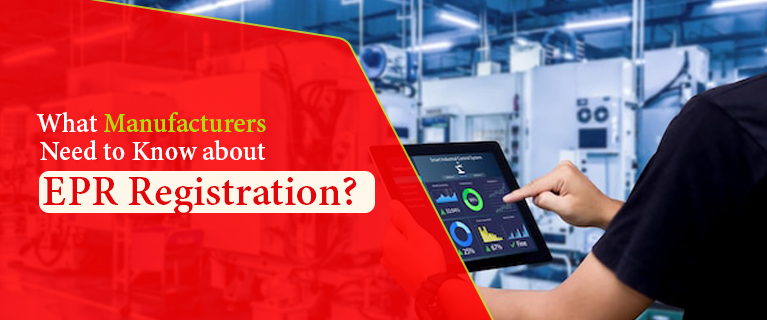EPR Registration In The Digital Age
In today's digital age, the concept of Extended Producer Responsibility (EPR) has gained significant importance as businesses strive to reduce their environmental footprint and promote sustainability. EPR registration plays a crucial role in implementing effective waste management practices, ensuring the responsible disposal and recycling of products. In this blog, we will explore how EPR registration has evolved in the digital age, leveraging technology and digital platforms to streamline processes, enhance transparency, and drive greater efficiency. We will delve into the benefits, challenges, and opportunities of EPR registration in the digital era, highlighting its impact on businesses, consumers, and the environment.
1. Digital Transformation of EPR Registration
The digital age has revolutionized the way EPR registration is conducted, offering significant advancements in efficiency and effectiveness. Online platforms and digital systems have replaced manual paperwork, enabling businesses to register, report, and track their EPR obligations conveniently and in real time. Digital transformation has streamlined the registration process, reducing administrative burdens and enhancing data accuracy. Businesses can now submit information, upload documents, and make payments online, simplifying the overall compliance procedure.
2. Enhanced Data Management and Reporting
Digital platforms have revolutionized data management and reporting in EPR registration. Businesses can now capture, store, and analyze vast amounts of data related to their product lifecycle, waste generation, and recycling activities. This data-driven approach enables businesses to gain valuable insights, identify trends, and make informed decisions to optimize their waste management strategies. Additionally, digital reporting systems facilitate the accurate and timely submission of compliance reports, ensuring transparency and accountability in EPR initiatives.
3. Collaboration and Stakeholder Engagement
The digital age has facilitated collaboration and stakeholder engagement in EPR registration. Online platforms provide a space for businesses, government agencies, waste management entities, and consumers to connect, share knowledge, and collaborate on sustainable waste management practices. Digital communication channels enable the exchange of ideas, best practices, and feedback, fostering a culture of continuous improvement and innovation in EPR programs. Engaging stakeholders through digital platforms ensures a more inclusive and participatory approach, driving collective efforts toward a sustainable future.
Read Also This - The Importance of EPR Certification in Sustainable Waste Management4. Consumer Awareness and Education
Digital platforms play a vital role in raising consumer awareness and educating them about EPR initiatives. Through social media, websites, and online campaigns, businesses and regulatory bodies can disseminate information about responsible consumption, recycling, and the importance of EPR. Digital communication channels allow for interactive and engaging content, encouraging consumers to actively participate in waste management programs. This increased consumer awareness empowers individuals to make informed choices, support sustainable brands, and actively contribute to the circular economy.
5. Ensuring Compliance and Enforcement
Digital systems have strengthened compliance monitoring and enforcement in EPR registration. With real-time data tracking and reporting, regulatory bodies can identify non-compliant businesses more efficiently, leading to stricter enforcement of EPR regulations. Digital platforms also provide a means for businesses to demonstrate their compliance, maintain accurate records, and respond promptly to regulatory inquiries. This enhanced compliance ensures that the responsibility for waste management is upheld throughout the supply chain, protecting the environment and promoting a level playing field for businesses.
6. Overcoming Digital Divide and Accessibility Challenges
While the digital age brings numerous benefits to EPR registration, it is crucial to address the challenges of the digital divide and accessibility. Efforts must be made to ensure that all businesses, regardless of size or location, have access to digital platforms and resources for EPR registration. Additionally, user-friendly interfaces and multilingual support can enhance accessibility for businesses and individuals with varying levels of digital literacy.
7. Opportunities for Innovation and Scalability
The digital age presents exciting opportunities for innovation and scalability in EPR registration. Technological advancements, such as blockchain and Internet of Things (IoT), can be harnessed to create traceability and transparency throughout the waste management process. Smart devices and sensors can enable better waste tracking, automated data collection, and real-time monitoring of recycling activities. These innovations pave the way for scalable EPR solutions, driving efficiency, cost-effectiveness, and environmental sustainability.
Read Also This - Benefits of EPR Certification for Manufacturers and ProducersConclusion
In the digital age, EPR registration has evolved to embrace the benefits of technology, offering businesses and regulatory bodies new avenues for responsible waste management and sustainability. From streamlined processes and enhanced data management to increased stakeholder engagement and improved compliance, the digital transformation of EPR registration holds tremendous potential for creating a circular economy. By leveraging digital platforms, businesses can fulfill their extended producer responsibilities more efficiently, reduce their environmental impact, and contribute to a greener and more sustainable future.




When I read this article it seems very informative thanks for sharing also get details about Business setup consultants in UAE
ReplyDelete